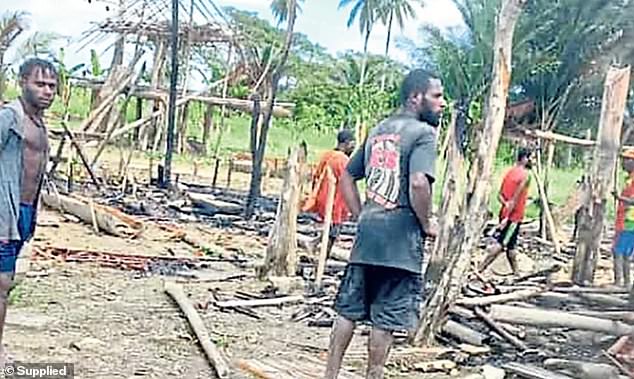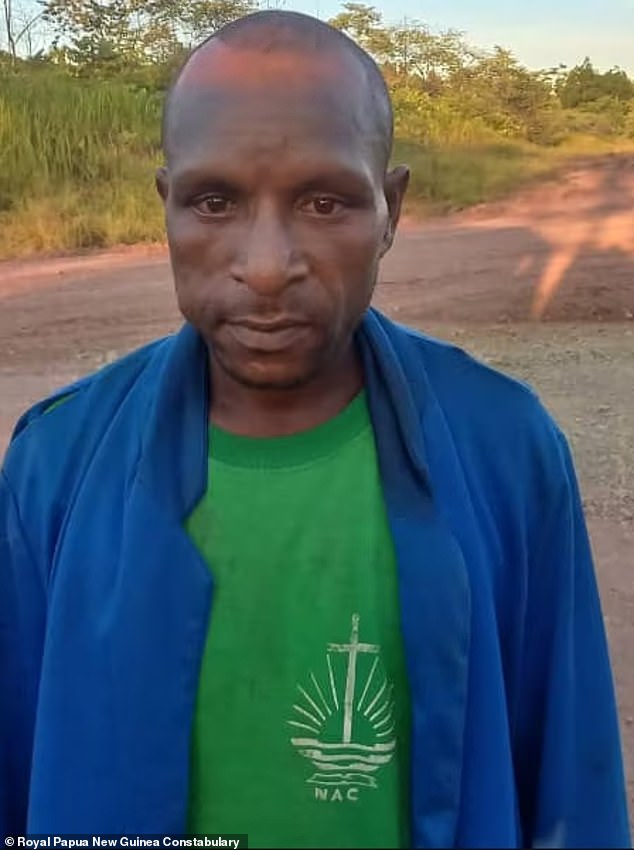The alleged ringleader of a gang accused of killing 26 people, including 11 children, in a remote area of northern Papua New Guinea has handed himself in to police.
Royal Papua New Guinea Police said Jerome Malakai was in custody after turning himself in on Monday afternoon.
The horrific attack, believed to be a revenge killing turned massacre, occurred between July 18 and 20, when about 30 men attacked two villages in the Kanda Circle area of East Sepik province, brandishing weapons including guns and knives.
The country’s national police force confirmed that five other alleged gang members were also arrested, the agency reported. alphabet.
Malakai was sought after he allegedly appeared in a video posted online showing gang members cutting up body parts from a dead victim and parading around with them.
More than 20 members of the gang, including another leader, are known to remain at large and hiding along the Sepik River.
The dense, swampy area is not easily accessible for police, who use boats to patrol the area and locate them.
Police say the attack, which also allegedly included the rape of women and children, was led by Malakai in retaliation for the killings of some of his relatives allegedly committed by a local government councillor in the region.
Papua New Guinea’s national police force said Jerome Malakai (pictured) is in custody after allegedly being a ringleader in the “barbaric” massacre in which 26 people, including 11 children, were killed.
The gang burned the villages to the ground while about 200 residents who were not killed fled and sought refuge in nearby towns.
Superintendent Christopher Tamari said the dispute between the groups dates back years.
“It’s all political, it’s all family,” he said.
“Why innocent children and women? This is senseless. It’s outrageous… I have no answer for that, so I’m sorry,” he told ABC.
The United Nations condemned the attack in July.
“I am horrified by the shocking outbreak of deadly violence in Papua New Guinea, apparently resulting from a dispute over land and lake ownership and use rights,” UN High Commissioner for Human Rights Volker Turk said in a statement.
The village of Angrumara was attacked on 17 July, when a man and a boy were killed; then the nearby village of Tambari was attacked the following day, while most of the villagers were asleep.
Women and girls were raped and murdered and some men from the village were also killed.

Violent attacks on remote villages in the East Sepik region of northern Papua New Guinea (PNG), in which homes were burned to the ground, have left more than 200 villagers displaced, the national police force said.
Acting East Sepik provincial police commander Senior Inspector James Baugen told the Papua New Guinea Post-Courier that mothers who were breastfeeding their babies had been decapitated.
“Some of the bodies that were left abandoned during the night were dragged by crocodiles into the swamp. We only saw the place where they were killed. There were severed heads,” Baugen said.
Papua New Guinea has more than 800 indigenous languages and has been divided by tribal conflicts over land for centuries.
Most of the land belongs to tribes rather than individuals. Without clear borders, territorial disputes never end.
These conflicts have become increasingly lethal in recent decades as fighters switch from bows and arrows to assault rifles and mercenaries become increasingly involved.
Blake Johnson, an analyst at the Australian Security Policy Institute think tank, said that while the East Sepik killings appeared to be a particularly gruesome event, “it is not the first case of mass murder this year” in Papua New Guinea.
“The escalation of violence between groups, often leading to retaliatory killing, is at best culturally accepted and at worst encouraged,” Johnson said.
Law enforcement officials lack the resources and training to police most of the country, he said.
“The country is too big, too harsh and too difficult to navigate, and we don’t even know how many people live in these places,” Johnson said.


